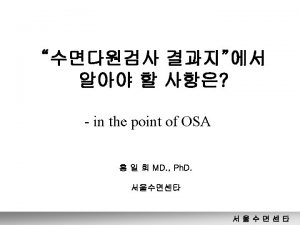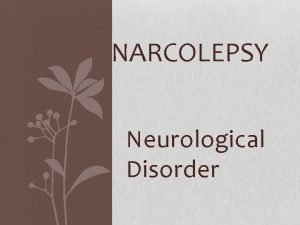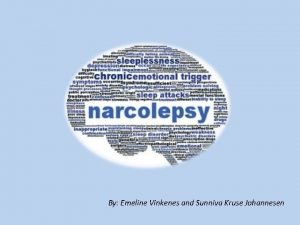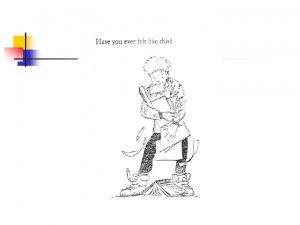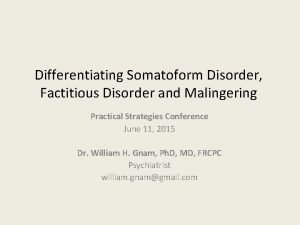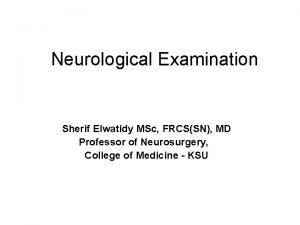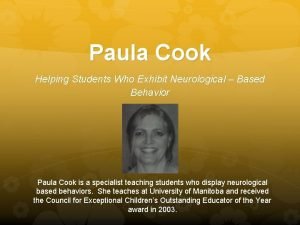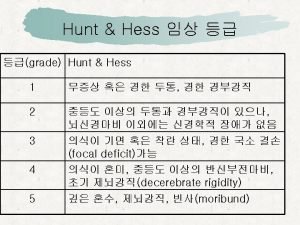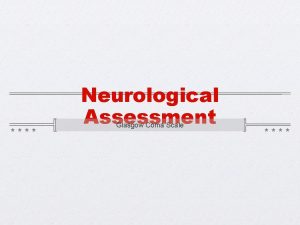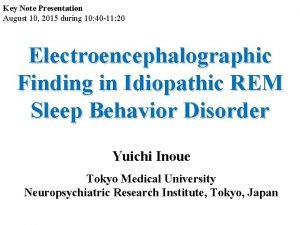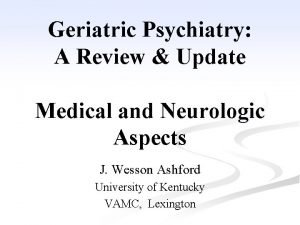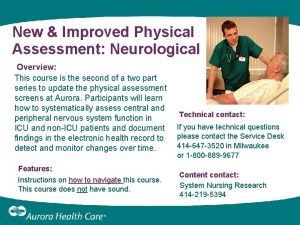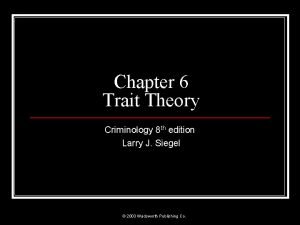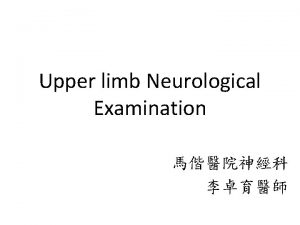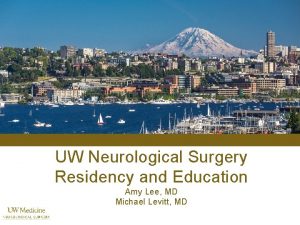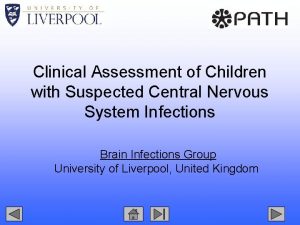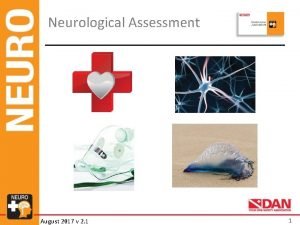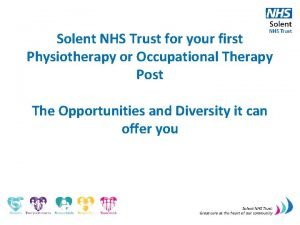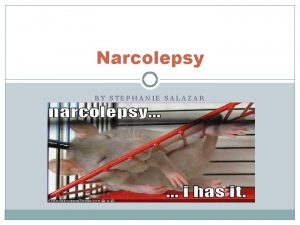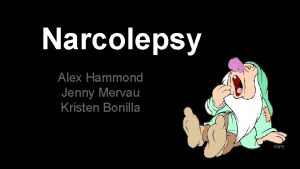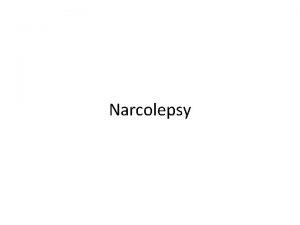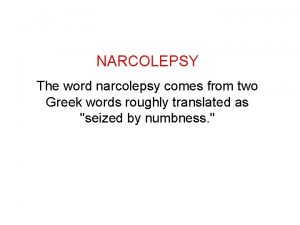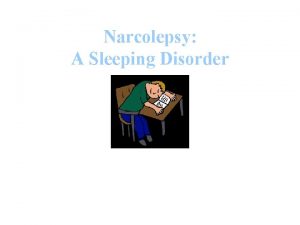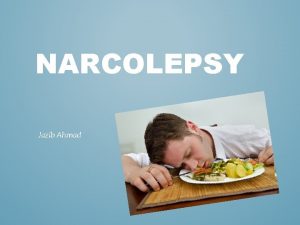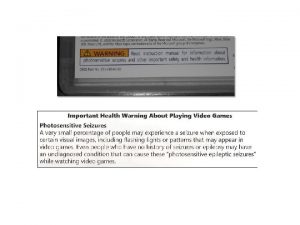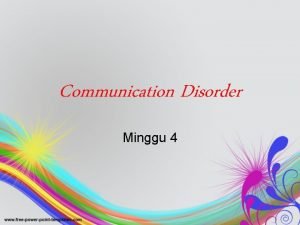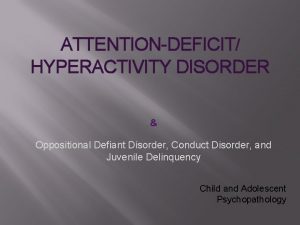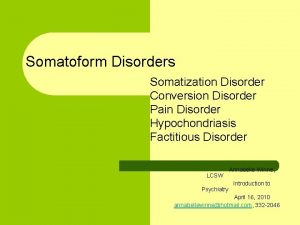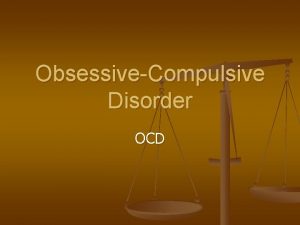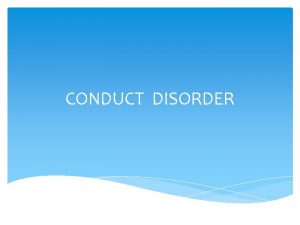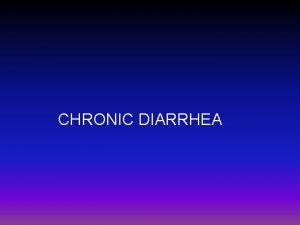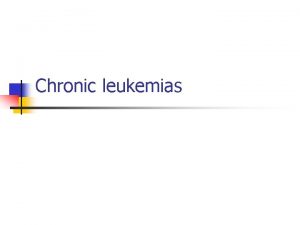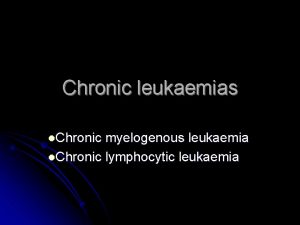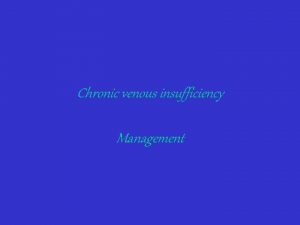NARCOLEPSY Neurological Disorder What is it Chronic neurological



















- Slides: 19

NARCOLEPSY Neurological Disorder

What is it? • Chronic neurological disorder affecting brain’s ability to regulate sleep-wake cycles. • Two types: • Narcolepsy with Cataplexy

Go to Sleepzzzzzzzzzzz • NREM(Non-Rapid Eye Movement) Step 1 • REM(Rapid Eye Movement) Step 2 • NREM (80 -100 minutes)

Biological Alarm Clock

With Narcolepsy: • There is no step 1 (NREM= Non rapid Eye movement) • REM IMMEDIATELY

Defined by four major symptoms • Excessive: daytime sleepiness (EDS). • Cataplexy: most dramatic symptom of narcolepsy • Hypnagogic hallucinations: intense and sometimes terrifying experiences • Sleep paralysis: frightening inability to move shortly after awakening or dozing off.

Main sign: Daytime sleepiness may cause: • Mental cloudiness or "fog" • Memory problems • Problems focusing • Lack of energy • Depression • Extreme exhaustion

Other signs: • Fall asleep suddenly (any where, any time) • sleep longer than usual (up to 18 hrs a day ) • Experience drowsiness • Wake up frequently during night time hours • Sleep attacks last from few sec. to an hour

Narcolepsy with Cataplexy the most severe one • Loss of muscle tone(Cataplexy) • Head nodding • Drooping eyelids • Difficulty speaking • Difficulty moving arms or hands or a weakened grip • Buckling of the knees • Can be associated with sleep-onset or sleep-offset paralysis • Exceptionally can last from hours to days!! • https: //youtu. be/VA 6 Fei. Gg. LF 0

RESEARCH: Discover • People with narcolepsy: lack of Orexin • hypocretin 1 -2 (Orexin A and B) • Regulates the sleep-wake cycle

Sleep attacks triggered By Strong Emotions: • Laughter • Anger • Fear • Excitement

Co-morbidity varies Disorder Narcolepsy (%) Controls (%) Adjusted Odds Ratio P Value Major depressive disorder 17. 1 6. 4 2. 7 <. 001 Bipolar disorder 8. 5 1. 9 4. 6 <. 001 Post-traumatic 11. 3 stress disorder 5. 3 2. 1 <. 001 Social anxiety 21. 1 8. 7 2. 4 <. 001 Panic disorder 12. 5 3. 9 3. 2 <. 001 Agoraphobia 8. 5 1. 3 6. 5 <. 001 Simple phobia 5. 2 1. 3 4. 1 <. 001 Obsessivecompulsive disorder 3. 7 1. 0 3. 8 <. 001 Generalized anxiety disorder 5. 5 1. 7 3. 3 <. 001

Psychosocial impact • Adult, Child and Teens: • Severe psychosocial stress • Embarrassment, • Academic decline • Feelings of loss of self-worth related to the symptoms of their disease. • Adult narcoleptics also face the concerns of the workplace • Accident at home or other places

Psychosocial Impact (Cont. ) • need for stimulants often creates problems with pharmacists and family.

How is narcolepsy diagnosed? • Patient's symptoms • family history of narcolepsy • physical exam • test results

SPECIFIC TESTS with Sleep Specialist • Polysomnogram (PSG) • Multiple sleep latency test (MSLT) • Hypocretin test (Require to sleep overnight in a sleep disorder center

How is narcolepsy treated? • No CURE • Medicines to relieve daytime sleepiness: • Stimulant: . Modafinil • Pemoline • Methylphenidate • Amphetamines • Medicines to relieve other symptoms: • Several Different Antidepressant


 Rera psg
Rera psg Narcolepsy
Narcolepsy Modafilin
Modafilin Is adhd a neurological disorder
Is adhd a neurological disorder Factitious disorder
Factitious disorder Neurological examination
Neurological examination Neurological based behavior
Neurological based behavior Wfns scale
Wfns scale Neurological observations glasgow coma scale
Neurological observations glasgow coma scale Neurological considerations in language acquisition
Neurological considerations in language acquisition Neurological assessment chart
Neurological assessment chart Neurological disease
Neurological disease Neurological examination
Neurological examination Neuro wdl
Neuro wdl Biosocial trait theory
Biosocial trait theory Muscle power neurological examination
Muscle power neurological examination Amy lee plastic surgery
Amy lee plastic surgery Muscle power neurological examination
Muscle power neurological examination Motor function neurological assessment
Motor function neurological assessment Solent physiotherapy
Solent physiotherapy
